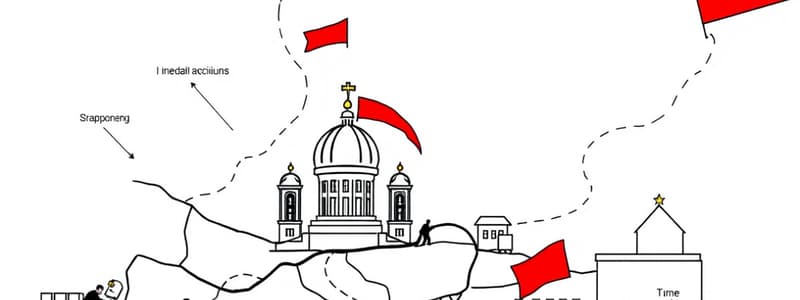Podcast
Questions and Answers
What is a key characteristic of a planned economy?
What is a key characteristic of a planned economy?
- The government regulates production and pricing (correct)
- Private ownership of businesses
- Economic activities are based on individual initiative
- Market prices are determined by supply and demand
In capitalism, the government controls the economy.
In capitalism, the government controls the economy.
False (B)
What are the limitations of socialism as described?
What are the limitations of socialism as described?
Public sector dominance, lack of private initiative, price determination by the public sector, progressive debt processes.
In a mixed economy, the state helps sectors of the population when financial support is needed, ensuring __________.
In a mixed economy, the state helps sectors of the population when financial support is needed, ensuring __________.
Match the economic systems with their characteristics:
Match the economic systems with their characteristics:
Flashcards are hidden until you start studying
Study Notes
Capitalism vs. Socialism
- Capitalism separates the economy from government control, allowing private ownership and market-driven principles.
- Socialism involves government control, with the state determining production, pricing, and distribution of goods.
Planned Economy (Socialism)
- Production decisions are made by the state, including what is produced, how it is made, and the target consumers.
- The common good is prioritized over individual wealth, preventing individuals from becoming rich at the expense of others.
- Limitations include:
- Public sector dominance in economic activities.
- Lack of private initiatives to foster innovation.
- Prices set by the government can lead to inefficiencies.
- Risk of progressive debt accumulation.
Free Market Economy (Capitalism)
- A free market economy relies on minimal state intervention, allowing market forces to dictate prices and production.
- The state ensures market and economic freedom through laws that promote fair negotiations and maintain public safety.
- Limitations in capitalism include:
- Increasing inequality among wealth distribution.
- Potential for cyclical economic and political crises.
- Concentration of power in the hands of business owners, which may lead to exploitation.
Mixed Economy
- A mixed economy combines elements of capitalism with state intervention to stabilize and regulate economic activities.
- The government provides public goods and aims to maintain price stability and employment rates.
- Regulatory measures are enforced to protect consumer rights and mitigate abuses by companies.
- The state also offers financial assistance to support vulnerable populations during economic hardships.
Studying That Suits You
Use AI to generate personalized quizzes and flashcards to suit your learning preferences.




